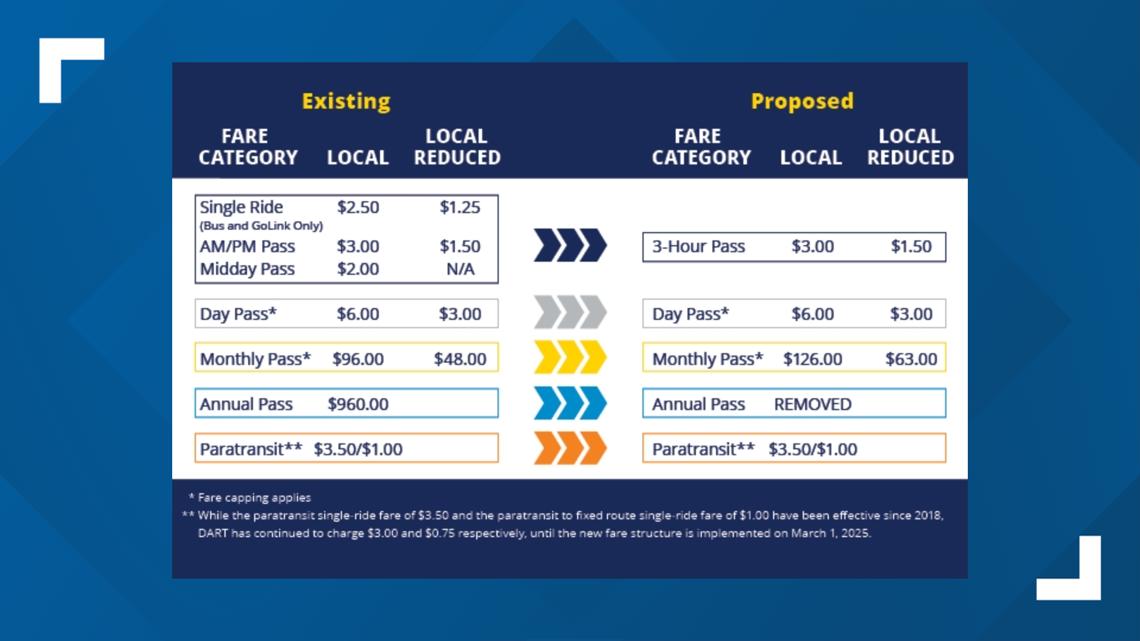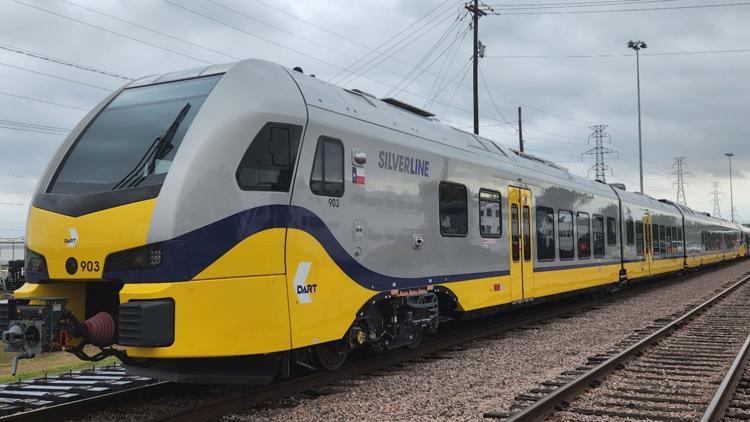DALLAS — Dallas Area Rapid Transit (DART) is considering raising some of its rates and eliminating some fare options.
The discussions come as some North Texas cities have approved resolutions to reduce their allocation of sales tax revenue to DART.
Among the changes under consideration include eliminating the single-ride/ AM/PM pass and midday pass options. The single-ride fare is $2.50 for local and $1.25 for local reduced service. The AM/PM pass is $3 for local and $1.50 for local reduced service.
Monthly pass fares would be raised to $126 from $96 (and to $63 from $48 for reduced monthly passes.
Annual passes for non-employees would also be removed and day passes will stay the same. Those fares are $6 for local and $3 for local reduced service.
A paratransit fee change from $3 to $3.50 would also be implemented as part of the proposal.


Other proposed changes include implementing a new discount program for veterans, making the discount GoPass tap card program for qualified low-income customers permanent, incentivizing bulk sales for special events, corporate and educational institution programs, creating a monthly payment option in the corporate annual pass program and expanding the educational institution program to include elementary schools.
The proposed fares would be DART’s first fare hikes since 2018.
“For the past six years, nothing has been done because of COVID so it was something that they had to look at again. They started to look at this in 2021 – didn’t do anything because there were still COVID impacts, and now they’re at a point where they wanted to bring this backup,” said DART executive vice president and chief communications officer Jeamy Molina.
DART has begun hosting virtual meetings to gather feedback on the changes proposed. There are 10 planned throughout the rest of July and August. A formal public hearing is set for 6 p.m. on August 27 before the proposed changes would come up for a vote. If approved, the changes would take effect in 2025.
DART’s largest source of revenue is a voter-approved sales tax within its service area, which includes 13 municipalities (Addison, Carrollton, Cockrell Hill, Dallas, Farmers Branch, Garland, Glenn Heights, Highland Park, Irving, Plano, Richardson, Rowlett and University Park).
According to DART’s 2024 annual budget and 20-year financial plan released in August of 2023, DART forecast sales tax revenues of $870.8 million in the fiscal year 2024, an increase of $51.8 million (6.3 %) from the fiscal year 2023 budget and $40.8 million (4.9 %) from their fiscal year 2023 forecast. The 20-year financial plan assumed fare increases of about 9% every three years.
The fare changes come as several member cities, including Rowlett and Plano (which is the largest contributor to DART behind Dallas) approved resolutions to reduce their tax allocations to DART. On July 2, University Park postponed consideration of a resolution in support of capping their sales and use tax revenue to DART.
Potentially diverting some sales tax funds from DART is also an option Dallas leaders have discussed to help shore up the Dallas Police and Fire pension system. That process would require the DART board and voter approval.
So what does that mean for DART?
“No one city has the authority to unilaterally reduce their tax rate. The 15-member DART board of directors are the only ones that can reduce the rate levied to all service-area cities,” said Molina. “If the board of directors decides to do that, it has to be done to all 13 cities and that is not on the table right now.”
Molina said if that happens, reducing the DART sales tax rate (from the current penny rate) would equate to $6 billion less in revenue over the life of the agency’s 20-year financial plan.
“Some likely scenarios would be a reduction in all of our routes [bus and rail] to no more than 30-minute frequency to devastating effect on some of the most vulnerable populations that rely on DART to access jobs, healthcare, education. We’d see major reductions in our staffing,” Molina said.
Other headlines:



